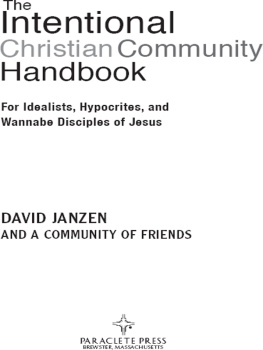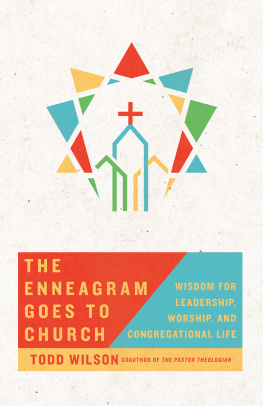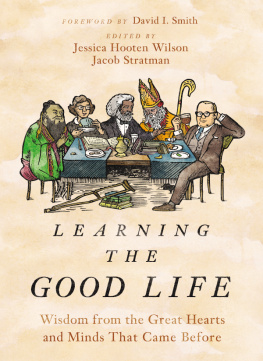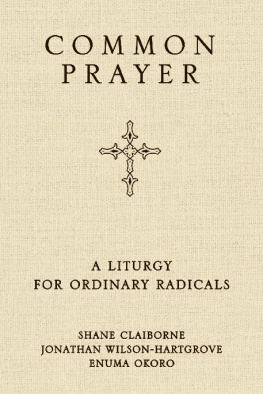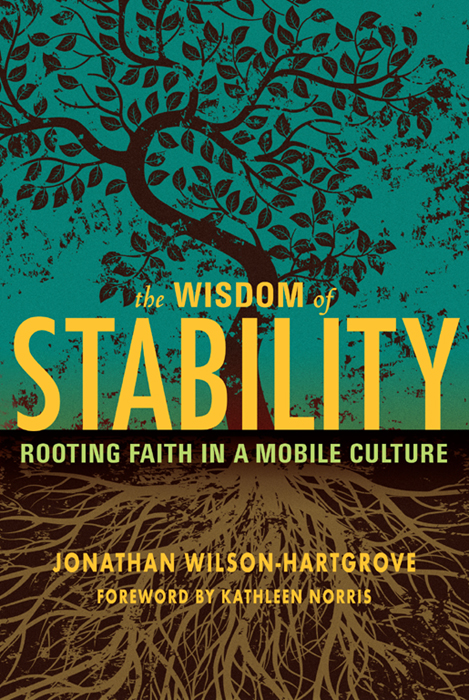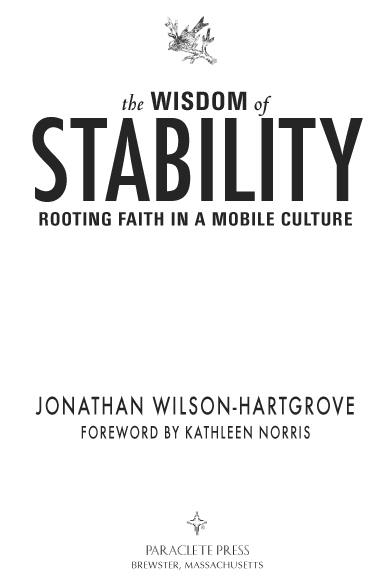
The Wisdom of Stability: Rooting Faith in a Mobile Culture
2010 First Printing
Copyright 2010 by Jonathan Wilson-Hartgrove
ISBN: 978-1-55725-623-2
Unless otherwise noted, scriptural references are taken from the New Revised Standard Version Bible, copyright 1989 by the Division of Christian Education of the National Council of the Churches of Christ in the United States of America, and are used by permission. All rights reserved.
Scriptural references marked kjv are taken from the Authorized King James Version of the Bible.
Library of Congress Cataloging-in-Publication Data
Wilson-Hartgrove, Jonathan, 1980
The wisdom of stability : rooting faith in a mobile culture/by Jonathan Wilson-Hartgrove ; Foreword by Kathleen Norris.
p. cm.
Includes bibliographical references (p.).
ISBN 978-1-55725-623-2
1. HomeReligious aspectsChristianity. 2. Christian lifeBaptist authors. 3. Vow of stability. I. Title. BR115.H56W55 2010
248dc22 2010000111
10 9 8 7 6 5 4 3 2 1
All rights reserved. No portion of this book may be reproduced, stored in an electronic retrieval system, or transmitted in any form or by any meanselectronic, mechanical, photocopy, recording, or any otherexcept for brief quotations in printed reviews, without the prior permission of the publisher.
Published by Paraclete Press
Brewster, Massachusetts
www.paracletepress.com
Printed in the United States of America
For Dad ,
who established roots of love in Stokes Countys soil
and keeps bearing fruit.

CONTENTS
FRONT PORCH
Bird Watching
FRONT PORCH
Bare Feet
FRONT PORCH
Visiting
FRONT PORCH
Sitting and Rising Again
FOREWORD
I t is brave of Jonathan Wilson-Hartgrove to tackle the subject of stability, when in American culture we learn early on to keep our options open, always ready for the new, improved model, the latest best thing. We consider stability tedious at best. At its worst it is seen to restrict our freedom and limit our potential. For many of us, stability is an uneasy concept; we dont think about it much except to worry that if we remain in one place while the world changes around us we risk stagnating and becoming irrelevant. In a postmodern era of exponential change, how can we take stability seriously, let alone consider it a virtue?
In often surprising ways, this author forces stability from its cocoon of abstraction and dislodges our comfortable assumptions about it. He asks us to consider, among other things, the political and social implications of stability. Writing of the troubled neighborhood where he and his family have chosen to put down roots, Wilson-Hartgrove notes that its problems are directly connected to a culture where success means moving up and out . The homelessness of guys who are hooked on crack is but the flipside of the placelessness that drives ambitious young students to see this university town as a stop on their way to somewhere else. In a culture devoted to the pursuit of success and fame, what makes stability so unappealing may be that it acts as the great leveler in a society of widening gaps, calling each of us, whatever our social status, to acknowledge the extent to which were equally bound by powers beyond our control. What we most need, the author insists, is something that only stability can provide, a way of life founded on solid ground, freeing us from the illusion that we can live without limits.
Stability might have remained an abstract concept for me had I not, much to my surprise and often against my better instincts, found myself in a marriage that lasted for nearly thirty years until my husband died. The wonderful insight of Wilson-Hartgroves, that stability is not something we accomplish but is always a gift, resonates with my own experience. The hearts true home, he writes, is a life rooted in the love of God, but the Christian tradition insists that this love is always Gods mercy directed at us before it is our response of trusting love. God offers us stability in the only thing that cannot failGods faithfulness itself (emphasis mine). Sometimes the conviction that it is God who has brought two peopleor a communitytogether is all we need to keep us in the struggle to nurture and maintain relationships of trust, respect, and love. Committing to such stability is never easy, but it is always worth a try.
Drawing on the 1700-year-old Christian tradition of monastic wisdom, the author reminds us that when we opt for stability we face a cosmic struggle. There are internal battles, of course, mostly with the demons of anger, pride, and boredom. But to commit to stability also means accepting other people as they are. How dreary to consider that God has given us this family, this spouse, these colleagues on the job, this church congregation. Surely we are meant for more important things, and our talents will be better appreciated by a more sophisticated crowd. Hitting on what he terms a bedrock reality, Wilson-Hartgrove reminds us of the main reason Christianity will always remain unpalatable to those who are seeking an easy, ethereal spirituality. Life with the God we know in Jesus Christ, he writes, is lived in community with other people. Of course conflicts will come. Our job is to face them openly and honestly, and above all, to seek reconciliation. Stability is an essential in this process.
Seek is perhaps a dangerous word to use when discussing stability, because in some ways stability is the antithesis of the relentless seeking that is so prominent a part of American religious life. One of the more radical premises of this book is that there comes a time to set seeking aside. But as the romance of our initial religious experience fades, and the reality of life with other human beings in a church congregation seems too much to bear, we are tempted to move on. Wilson-Hartgrove asks us to stop a moment and ask if we might abandon our seeking, settle down, and allow God to find us where we are.
With its appealing mixture of personal experience and reflection along with lively biblical interpretation, this is a book in the tradition of Annie Dillards Pilgrim at Tinker Creek, demonstrating the wealth of wisdom that can come when we commit ourselves, as Wilson-Hartgrove writes, to a place and watch it change before our eyes. Stability helps us to do the necessary foundation work so that we can pay close attention to what is going on around us, and adapt to changing conditions without losing our sense of place. Only stability can give us a way to accept the vicissitudes of life with a sense of peace, and even joy. It does not limit us but encloses us within Gods love, so that with the psalmist we can say:
The boundary lines have fallen for me in pleasant places;
I have a goodly heritage. (Psalm 16:6)
K ATHLEEN N ORRIS
Honolulu, Hawaii
INTRODUCTION
T his is a book about staying put and paying attention. In a culture that is characterized by unprecedented mobility and speed, I am convinced that the most important thing most of us can do to grow spiritually is to stay in the place where we are. I am not advocating a stubborn provincialism or harking back to a time before the Internet and the automobile when things were simpler and life was easier. Nor am I denying that God called Abraham, saying, Go or that Jesus left his disciples with roughly the same marching orders. But I am convinced that both our use of new technologies and our faithful response to Gods call depend on something more fundamentala rootedness that most of us sense we are missing in our hurry to keep up amid constant change. I believe we need to recover the wisdom of stability.




